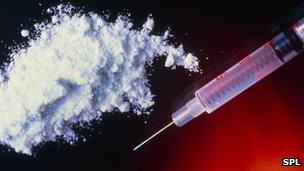Drug-driving proposals unveiled by government
- Published

The proposals follow a report by experts on the issue of drug-driving
Plans to make it easier to prosecute people who drive under the influence of illegal drugs in England and Wales have been unveiled by the government.
The proposals would introduce a new offence of driving with a drug in the body, above a certain limit.
Ministers said the legislation would remove the difficulty of proving a driver was impaired by drugs.
The plans also propose limits for some prescribed drugs such as diazepam. The plans are out for consultation, external.
'Ruins lives'
The government said it was proposing a "zero-tolerance" approach to drug drivers.
It proposes including eight drugs - cannabis, ecstasy, cocaine, ketamine, benzoylecgonine (primary metabolite of cocaine), methamphetamine, LSD and 6-monoacetylmorphine (heroin and diamorphine) under the "tough approach", for which allowable limits would be set very low.
And it is proposing higher limits for eight other controlled drugs which have medical uses.
These are clonazepam, diazepam, flunitrazepam, lorazepam, methadone, morphine, oxazepam and temazepam.
Police would be able to carry out up to three preliminary saliva tests and, if positive, require a blood sample to be taken.
It is consulting on which drugs should be included and what the limits for each should be, after it announced in January 2012 it would be introducing the new offence.
The proposals follow a report published in March this year by a panel of medical and scientific experts, external to advise the government.
Ministers said the new offence would reduce wasted time, expense and effort for the police and courts when prosecutions failed.
Roads minister Stephen Hammond said: "Drug-driving is a menace which devastates families and ruins lives. That is why we are proposing to take a zero-tolerance approach with those who drive under the influence of illegal drugs and sending a clear message that this behaviour will not be tolerated.
"We have also put forward our proposals for dealing with drivers who use specific prescribed drugs.
"We know that the vast majority of people who use these drugs are doing so responsibly and safely and that is why our approach does not unduly penalise drivers who have taken properly prescribed medicines.
"Together, these proposals will make our roads safer for everyone by making it easier for the police to tackle those who drive after taking illegal drugs and clarifying the position for those who take medication."
'Increasing clarity'
Although the draft plans are for England and Wales, the consultation has been extended to Scotland.
Motoring organisation the RAC welcomed the government's move "to bring increasing levels of clarity to driving on illegal drugs and prescription medication".
Technical director David Bizley said it was "something that is very much needed".
"Motorists will be happy to see the government taking a lead on this and ensuring people understand their position - and what happens if they step over the line," he said.
- Published4 January 2013